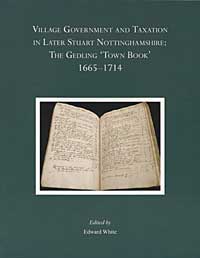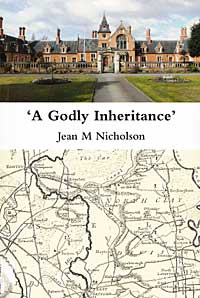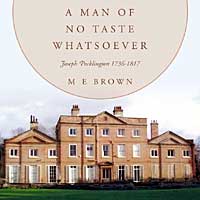Book reviews, Winter 2010
Edward White ed., Village Government and Taxation in Later Stuart Nottinghamshire: the Gedling "Town Book", 1665-1714 (Thoroton Record Society, 45, 2010)

During the course of the sixteenth and seventeenth centuries the government shifted responsibility for local government from the manor to the parish and the county. The manor court became responsible for the administration of copyhold and oversight of the agricultural cycle, and in many cases across the Midlands it stopped meeting altogether. Meantime the parish had to adapt to the new roles. It had long been traditional to appoint churchwardens to maintain the fabric of the church, hence the survival of churchwarden's accounts, but with the transfer of responsibility to the parish of the poor law, and law and order, as well as tax collection and other positions, additional officers were required to undertake the new roles.
Ted White's volume of the Gedling Town Book not only makes a welcome addition to the Nottinghamshire literature, which included Martin Bennett's edition of the Upton Constable's Book in the Record series, but provides intimate details of how the parish took over the responsibilities and divided them among the leading farmers. The town book includes financial accounts for the years 1664-1714 for all three officers, churchwardens, constables and overseers. The leading farmers served their turn in each position, acting as a governing elite. Variously compiled by the schoolmaster and others, the book records the work of the officers, and gives details relating to taxation and other income, expenditure, and wider issues of local government including suicides, sudden deaths, policing, and vermin control. The churchwardens had to look after the fabric of the church, the bells, the clock and the windows; and the overseers to deal with the poor, including those on long and those on short term assistance, funerals, apprenticeships, illegitimate children and vagrants. Much of the work was mundane, some was harrowing, and always there was the need to raise taxation.
The document speaks for itself, but in the best tradition od a record society publication Ted has written an excellent introduction designed to help the reader understand the limits of the evidence in the town book but telling us also about the community of Gedling in the 17th century. The Town Book offers us a glimpse behind the proverbial curtains of the village, to get a sense of everyday life as local people sought to get on with making a living, and keeping themselves warm and fed. If you are not a member of the Record Society do buy a copy and enjoy the read.
John Beckett
Jean M. Nicholson, 'A Godly inheritance': the History of the hospital of the Holy and Undivided Trinity, West Retford, and the Denman Family (Trinity Hospital, 2010)

Jean Nicholson's long awaited book has at last hit the bookshops - and the Thoroton Society bookstall. Since 1997 Jean has been working on her history of Trinity Hospital, wading through the records (many of which needed cleaning before she and, until his death in 2003, Joe could decipher them).
The story is well told, of how John Darrell left funds in 1665 to establish a hospital for sixteen poor men in the manor of West Retford. He also left money to help a Retford boy go to Exeter College, Oxford, annually.
Jean tells the story with her usual enthusiasm, illustrating it with family details, maps and pictures, and plenty of information about West Retford itself.
I am sure Thorotonians who read the book will want Jean to organize a Society excursion to the area, with an opportunity perhaps to meet the fifteen bretheren who still enjoy a 'quiet retreat' at the Hospital, and to set in context this remarkably long lived piece of charitable giving by John Darrell.
John Beckett
M. E. Brown, A Man of No Taste Whatsoever: Joseph Pocklington 17361817 (Author house, 2010)

Joseph Pocklington is best known for upsetting Wordsworth and Coleridge by his activities on Derwentwater in the Lake District, while contributing to the promotion of tourism in the area. Until I read Margery Brown's book I had no idea that he was also a landowner in Nottinghamshire, albeit a rather eccentric one with a taste for vulgar display.
He built Muskham Hall in the 1790s, although it was demolished in the 1830s and has left little trace of its short history.
The book is as much about Cumbria as it is about Nottinghamshire, but that is the nature of the sources (although these are never cited). Pocklington died at Muskham, and there is a memorial to him in Newark church.
An interesting book, well worth reading: Pocklington's eccentric behavior is at last brought out into the open!
John Beckett